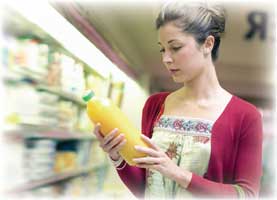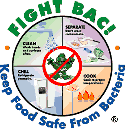|
 | June 2006 |

Juices provide many essential nutrients, but consuming untreated juices can pose health risks to your family. The FDA has received reports of serious outbreaks of foodborne illness that have been traced to drinking fruit and vegetable juice and cider that has not been treated to kill harmful bacteria.
While most people's immune systems can usually fight off the effects of foodborne illness, children, the elderly, and people with weakened immune systems risk serious illnesses or even death from drinking untreated juices.
Since 1999, the FDA has required juice manufacturers to place warning information on product containers about the health risks of drinking untreated juice or cider. Only a small portion of all fruit and vegetable juices sold in supermarkets is not treated to kill harmful bacteria. These products are required to carry the following warning label:
WARNING: This product has not been pasteurized and therefore may contain harmful bacteria that can cause serious illness in children, the elderly, and persons with weakened immune systems.
You should note that the FDA does not require warning labels for juice or cider that is fresh-squeezed and sold by the glass, such as at apple orchards, at farm markets, at roadside stands, or in some juice bars. If you're unsure if a glass of juice or cider has been treated, be sure to ask.
When purchasing juice, take these two simple steps to protect your children.
Look for the warning label to avoid the purchase of untreated juices. You can find pasteurized or otherwise treated products in your grocers' refrigerated sections, frozen food cases, or in non-refrigerated containers, such as juice boxes, bottles, or cans. Untreated juice is most likely to be sold in the refrigerated section of a grocery store.
Always ask if you're unsure if a juice product is treated, especially for juices sold in refrigerated cases of grocery or health food stores, cider mills, or farm markets. Also, don't hesitate to ask if the labeling is unclear or if the juice or cider is sold by the glass.
Consuming dangerous foodborne bacteria will usually cause illness within one to three days of eating the contaminated food. However, sickness can also occur within 20 minutes or up to six weeks later. In addition, sometimes foodborne illness is confused with other types of illness. Symptoms of foodborne illness usually include:
If you or your children experience these symptoms, see a health care professional who can properly diagnose foodborne illness, identify the specific bacteria involved, and prescribe the best treatment.
When fruits and vegetables are fresh-squeezed, bacteria from the produce can end up in your juice or cider. Unless the produce or the juice has been treated to destroy any harmful bacteria, the juice could be contaminated.
Everyone can practice safe food handling by following these four simple steps:
